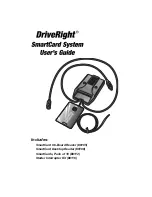
Lit. No. 72107, Rev. 02
14
November 15, 2018
INSTALLING ELECTRICAL HARNESSES
5. Run the data cable into the cab. Zip-tie the wire
under the dash so that it does not get in the way
of the brake or accelerator pedal. Leave enough
of the data cable outside of the dash so that the
operator can hold the control pendant in hand.
Install the pendant mounting base and bracket.
Stick the hook/loop fastener to the pendant and
pendant base.
6. Connect the harness to the back of the control.
Wrap loose control harness with cable ties and
move to the engine compartment. Do not mount
close to any heater vents.
7. Connect power leads to the battery:
Red: POSITIVE (+)
Black: NEGATIVE (–)
8. Always connect to the primary battery if using
a dual battery system. Secure loose loom to
any other large or medium vehicle harness with
medium-duty cable ties to secure the wiring
harness.
9. Push the ON/OFF button on the control to check
for power. When con
fi
rmed, turn power OFF. The
electrical portion of the installation is complete.
WIRING INSTRUCTIONS
1. Mount the rear plug bracket on the back of the
vehicle using supplied fasteners. Locate the
bracket toward the center of the bumper, as that
will reduce the amount of debris getting onto the
plug.
2. Mount the vehicle harness plugs to the bumper
bracket that was just installed. (The power
harness plug will need to be removed and
mounted to the bracket, then reconnected to the
wires.) Apply dielectric grease to the plugs.
3. Route the wires from the back to front using cable
ties or clamps (not supplied). Do not secure to
brake lines, fuel lines, or near exhaust, engine, or
moving parts. Use heavy-duty cable ties along the
frame and lighter duty cable ties everywhere else.
4. Drill a 3/4" hole in the
fi
re wall near the steering
column. Be sure to check for wires and
components in the way (both sides of the
fi
re wall)
before drilling the hole.
CAUTION
Before drilling holes, check to be sure that no
vehicle wiring or other components could be
damaged.
CAUTION
Do not alter, modify, or install additional
components in shaded areas shown below.
Failure to comply may interfere with airbag
deployment or cause injury to operator in an
accident.










































